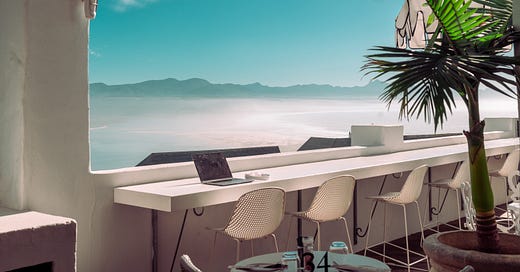The Irony of South Africa: From Apartheid to Rainbow Nation
I’m back in South Africa, enjoying time with my family and taking lots of trail walks in some of the most beautiful areas. South Africa is a land of contrasts: it's one of the most beautiful countries in the world, yet at the same time, it faces significant challenges when it comes to politics.
In my travels here, I found myself in an interesting conversation with a group of young men in their twenties. Having been born post-apartheid, in Mandela's and the ANC's 'Rainbow Nation', they shared insights on the challenges their people faced during apartheid. One significant issue was the sanctions: the isolation from the international community, being barred from sporting contests, and facing severe restrictions on international travel. They explained how difficult it was to leave South Africa, as they were ostracized even if they managed to obtain a visa.
This perspective shed light on a key factor in the white minority's decision to cede governmental power to the black majority. They handed over a country with a European standard of living, partly driven by a desire to end international ostracism, lift sanctions, rejoin global sports like rugby, and freely travel outside South Africa. The irony, as they noted, is the shift from a country people didn't want to leave, to one that many feel they must escape due to safety concerns, anti-white racial discrimination in policies like Black Economic Empowerment (BEE), racial tension manifesting in farm murders, and the ANC's push for Land Expropriation Without Compensation. Furthermore, the failing infrastructure, marked by frequent power outages, adds to the list of current challenges. Today, South Africa is free from sanctions and ostracism by the international community, yet there seems to be little international concern over these anti-white sentiments.
The situation in South Africa has progressed beyond irony; it's a profound tragedy written by those who believed in the dream of a 'Rainbow Nation.'
As we approach the national election here in South Africa next month, the ANC faces the possibility of losing its majority for the first time since coming to power in 1994. The main opposition party, the DA, is campaigning with the slogan 'Save South Africa,' which, one might rightly say, reflects the country's urgent need for rescue. However, the DA strongly upholds the ideal of the Rainbow Nation. Therefore, even if they were to influence national politics, it might only perpetuate the issues that have led South Africa to its current trajectory. It’s as though the DA is poised to attempt the same utopian vision the ANC failed to realize, setting themselves up for a similar failure. This situation falls into the same category as those who advocate for the implementation of communism, often under the pretext that previous regimes didn't practice 'real communism'. Similarly, the rhetoric here shifts to the notion of not having achieved a 'real Rainbow Nation'. This brings to mind Einstein's definition of insanity: doing the same thing over and over again and expecting different results. The persistence in pursuing an unattainable ideal without adapting the approach, despite repeated failures, is a stark reminder of this concept.

In my view, South Africa is beyond 'saving' in the traditional sense, and the DA's approach is nothing more than hubris on their part. I have little faith that the significant problems will be alleviated, regardless of the outcome of this or the next election cycle. In my opinion, the real problem-solvers are the Orania movement and similar organizations. Their hands-on approach to addressing issues operates independently of election outcomes. Their efforts in creating solutions and managing their own enclave present a nice contrast to the broader national issues. Moreover, they exemplify a shift from the irony of being in a country that once people didn’t want to leave, to now being in one that many feel compelled to leave. It underscores the notion that there truly is no place like home, especially when that home adapts to meet its challenges head-on.

Stay tuned and make sure to subscribe so you can receive the upcoming newsletter. In it, I will explore an interesting paradox regarding racism. On my way down to Cape Town from Johannesburg, I passed through Orania and met Pen, a black podcaster. He made a remarkable observation: he didn't feel the same racial tension in Orania as he did back in Johannesburg. But more on that in the upcoming newsletter.
All the best!
Jonas Nilsson




